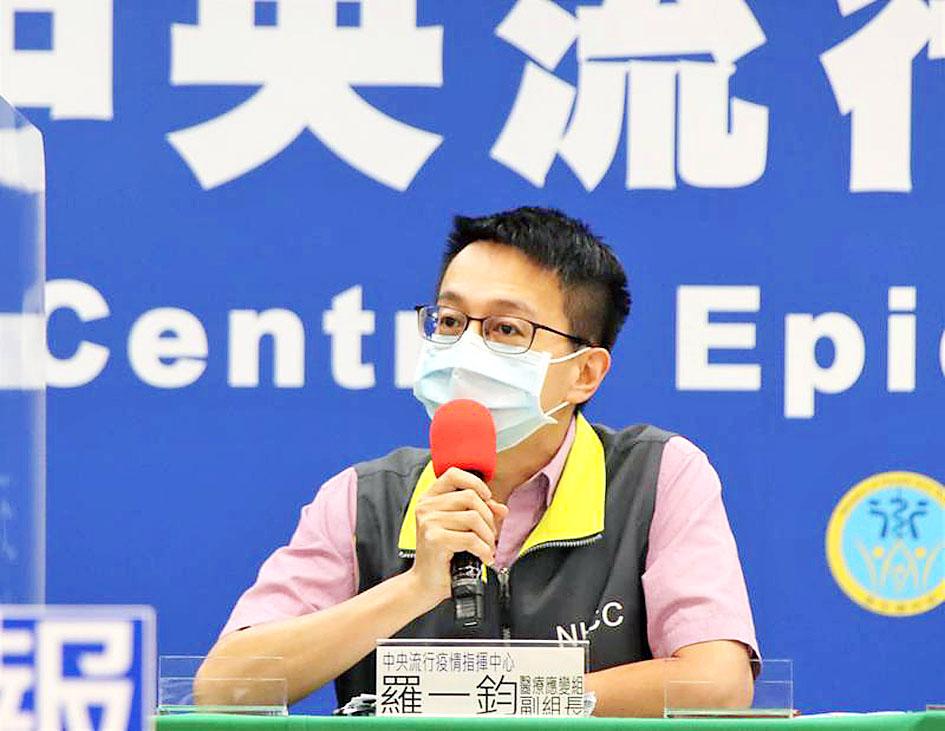The Central Epidemic Command Center (CECC) on Thursday announced guidelines for self-paid COVID-19 antibody tests, which were previously not open to the public.
CECC experts reached a consensus on the guidelines at a meeting on Wednesday, which was held following a controversy over an Internet celebrity receiving an antibody test at a clinic in Taipei.
According to the new guidelines, members of the public can visit medical facilities for antibody testing, but the facilities would have to apply in advance with local health authorities, said Centers for Disease Control Deputy (CDC) Director-General Philip Lo (羅一鈞), who is deputy head of the CECC’s medical response division.

Photo courtesy of the Central Epidemic Command Center
Before administering the tests, doctors would have to evaluate the test subject’s health, he said.
Should the person have any typical COVID-19 symptoms, the doctor should instead administer a polymerase chain reaction test, he said.
Only testing equipment approved by the Food and Drug Administration should be used, and facilities should file a report after each test including the testing method and result, and whether it tested for antigens or antibodies, he said.
Lo urged facilities to charge reasonable prices for the tests.
In other news, Lee Ping-ing (李秉穎), a pediatrician at National Taiwan University Hospital, yesterday on Facebook urged people to participate in a post-vaccination antibody testing study.
People aged 20 or older who had received one COVID-19 vaccine dose and are to receive their second dose could participate in the CDC-commissioned study into the change in people’s antibody levels, Lee said.
The study would put people into categories according to COVID-19 vaccine brands, he said.
People who are to have two shots of the AstraZeneca, Medigen or Pfizer-BioNTech vaccine could participate, as well as those who were first inoculated with the AstraZeneca vaccine, to be followed by a second dose of the Moderna or Pfizer-BioNTech vaccines, and those who had a first dose of the Medigen vaccine, to be followed by the Pfizer-BioNTech vaccine, he said.
Each category needs more than 200 participants, and there are still vacancies for the combinations Medigen-Medigen, Medigen-BioNtech, AstraZeneca-Moderna, AstraZeneca-BioNtech, he added.
Blood tests would be conducted before and after the second dose, as well as six, 12 and 18 months later, he said.
Additional reporting by Yang Hsin-hui

Three batches of banana sauce imported from the Philippines were intercepted at the border after they were found to contain the banned industrial dye Orange G, the Food and Drug Administration (FDA) said yesterday. From today through Sept. 2 next year, all seasoning sauces from the Philippines are to be subject to the FDA’s strictest border inspection, meaning 100 percent testing for illegal dyes before entry is allowed, it said in a statement. Orange G is an industrial coloring agent that is not permitted for food use in Taiwan or internationally, said Cheng Wei-chih (鄭維智), head of the FDA’s Northern Center for

LOOKING NORTH: The base would enhance the military’s awareness of activities in the Bashi Channel, which China Coast Guard ships have been frequenting, an expert said The Philippine Navy on Thursday last week inaugurated a forward operating base in the country’s northern most province of Batanes, which at 185km from Taiwan would be strategically important in a military conflict in the Taiwan Strait. The Philippine Daily Inquirer quoted Northern Luzon Command Commander Lieutenant General Fernyl Buca as saying that the base in Mahatao would bolster the country’s northern defenses and response capabilities. The base is also a response to the “irregular presence this month of armed” of China Coast Guard vessels frequenting the Bashi Channel in the Luzon Strait just south of Taiwan, the paper reported, citing a

UNDER PRESSURE: The report cited numerous events that have happened this year to show increased coercion from China, such as military drills and legal threats The Chinese Communist Party (CCP) aims to reinforce its “one China” principle and the idea that Taiwan belongs to the People’s Republic of China by hosting celebratory events this year for the 80th anniversary of the end of World War II, the “retrocession” of Taiwan and the establishment of the UN, the Mainland Affairs Council (MAC) said in its latest report to the Legislative Yuan. Taking advantage of the significant anniversaries, Chinese officials are attempting to assert China’s sovereignty over Taiwan through interviews with international news media and cross-strait exchange events, the report said. Beijing intends to reinforce its “one China” principle

A total lunar eclipse, an astronomical event often referred to as a “blood moon,” would be visible to sky watchers in Taiwan starting just before midnight on Sunday night, the Taipei Astronomical Museum said. The phenomenon is also called “blood moon” due to the reddish-orange hue it takes on as the Earth passes directly between the sun and the moon, completely blocking direct sunlight from reaching the lunar surface. The only light is refracted by the Earth’s atmosphere, and its red wavelengths are bent toward the moon, illuminating it in a dramatic crimson light. Describing the event as the most important astronomical phenomenon